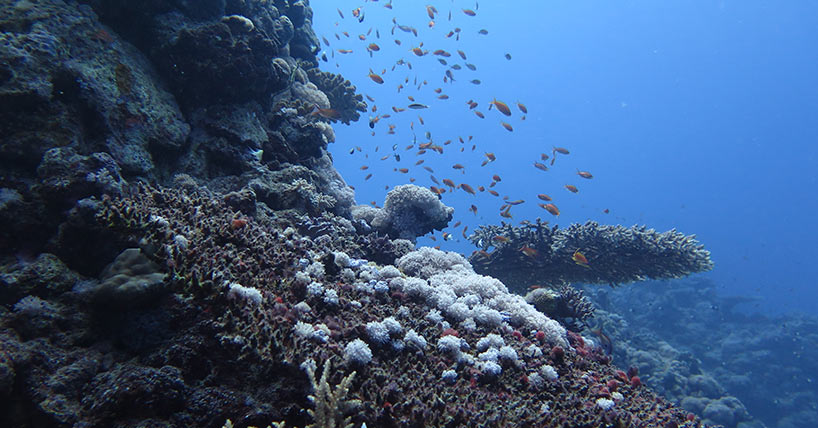coastal ocean deoxygenation
Rethinking ocean oxygen is key to tackling coastal deoxygenation
Published on: 28 July 2025
Marine life may be more resilient to climate stress than previously thought, thanks to shifting oxygen levels in coastal waters.
A Newcastle University-led study investigated the effects of deoxygenation (the loss of oxygen from the ocean) on coastal environments within the concept of the ‘oxyscape’ —the ever-changing oxygen landscape in coastal waters. Published in the journal Trends in Ecology and Evolution, the work proposes a new conceptual framework that will help to demonstrate how natural shifts in oxygen levels could help marine species better tolerate threats associated with climate change and contamination.
The authors highlight the urgent need to rethink how we understand and measure oxygen in our oceans. This involves a new way of thinking about oxygen, not just as something species need, but as resources they may compete for, depending on how much is available, how fast it is provided, and how crowded the environment is. The authors argue this approach could help scientists better predict where species will live, how ecosystems will respond to increasing temperature, and how to protect marine life more effectively.
Key oxygen-producing habitats such as kelp forests, coral reefs, seagrass meadows, mangroves, and some microbial communities help fight oxygen loss and create rich, healthy environments. Protecting and restoring these habitats is essential for keeping coastal marine life thriving in the face of climate change. By studying how marine organisms react to changing oxygen levels, we can better plan for the future, protect biodiversity, and support ocean health.

Maintaining coastal ecosystems
Study lead author, Dr Marco Fusi, Senior Lecturer in Marine Biology, at Newcastle University’s School of Natural and Environmental Sciences, said: “We often think of oxygen in marine ecosystems as stable and unchanging. But for marine life, oxygen levels are constantly shifting. Understanding this dynamic “oxyscape” is key to improving how we measure oxygen, assess deoxygenation, and evaluate ecosystem health.
“When animals are exposed to natural oxygen fluctuations, they can build tolerance to stressors like heatwaves and pollution. However, to truly grasp how marine life responds, we must move beyond a human-centred view and consider what marine organisms actually experience, especially in coastal environments where oxygen levels can vary dramatically.
“Conditions that seem mild to us may be extreme for fish, corals, and other sea life. That’s why we advocate for a new approach: measuring oxygen at the scale and frequency that animals experience it. This will help us design better experiments, develop smarter conservation strategies, and build more accurate climate models.”
Dr Fabrice Stephenson, Senior Researcher at Newcastle University, added: “Considering the dynamic nature of oxygen in coastal waters will help improve our predictions of how species will respond to climate change, providing a more robust forecast, for example, for important target species in fisheries.”
Dr Simone Baldanzi from University of Valparaiso in Chile also highlights the importance of capturing the real oxygen dynamics in coastal water: “It is fundamental to investigate how marine coastal species, including economically important resources, perceive and respond to changes in oxygen at scales that matter for the functioning of the coastal ecosystem. This will help to improve the management of fisheries and reduce the effects of ongoing global ocean deoxygenation”.
Dr Fusi concluded: “Protecting oxygen-producing habitats like seagrasses and mangroves, which naturally generate large oxygen fluctuations, not only supports biodiversity but also helps maintain coastal ecosystems.”
Image: Coral reefs are important tropical coastal ecosystem that provide an oxygen-rich microhabitat shaped by the interplay of photosynthetic corals and algae. Within this dynamic environment, diverse marine species navigate a mosaic of oxygen gradients that influence their behaviour, physiology, and distribution. The oxyscape concept highlights the importance of understanding the fine-scale oxygen variability in structuring reef biodiversity and resilience, offering new insights into how climate change and ocean deoxygenation may impact coral reef ecosystems. Credit: Ramona Marasco.
Reference:
Marco Fusi, Fabrice Stephenson, Sergio A. Navarrete, Fabian J. Tapia, John L. Largier, Ramona Marasco, Theresa Rueger, Chancey MacDonald, Daniele Daffonchio, Miriam Fernandez, Evie A. Wieters, Jenny Booth, Matteo Daghio, Heather Sugden, Katarina Scaife, Darren M. Evans, Pippa Moore, Simone Baldanzi, The ecology of the oxyscape in coastal ecosystems, Trends in Ecology & Evolution, 2025, https://doi.org/10.1016/j.tree.2025.06.008



